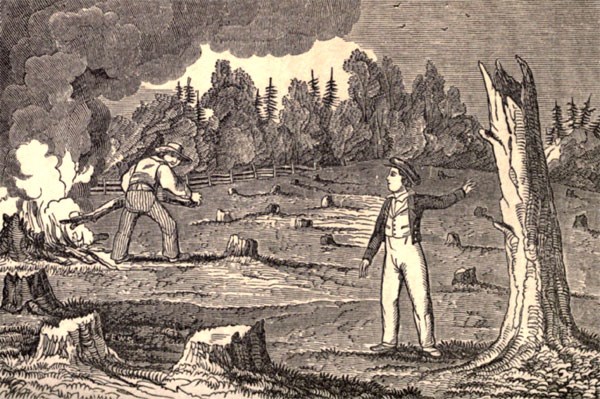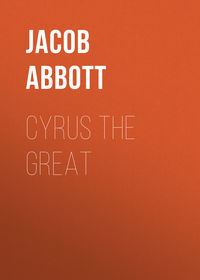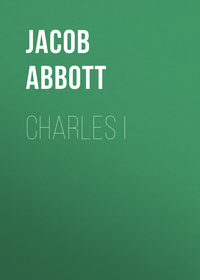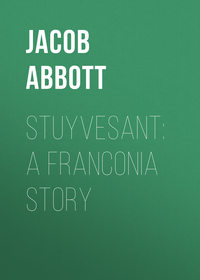![Rollo's Philosophy. [Air]](/covers_330/36364270.jpg)
Rollo's Philosophy. [Air]
Then she took up her scissors, and began to cut off some of the lightest down, saying, at the same time,—
"Now, children, I am going to give you some writing to do, about the air."
"Writing?" said Rollo.
"Yes," said his mother. "I am going to explain to you something about the air, and then you must write down what I tell you."
"But I can't write," said Nathan.
"No," said his mother, "but you can tell Rollo what you would wish to say, and he will write it for you."
"Why, mother," said Rollo, "I don't think that that will be very good play."
"No," replied his mother, "I don't give it to you for play. It will be quite hard work. I hope you will take hold of it energetically, and do it well.
"First," said she, "I am going to perform some experiments for you, before I tell you what I want you to write."
By this time, she had cut off the downy part of several feathers, and had laid them together in a little heap. Then she took a fine thread, and tied this little tuft of down to the end of it. Then she took up the thread by the other end, and handed it to Rollo.
"There, Rollo," said she. "Now, do you remember what your father told you, the other day, about the effect of heat upon air?"
"It makes it light," said Rollo.
"And why does it make it light?" asked his mother.
"Why, I don't exactly recollect," said Rollo.
"Because it swells it; it makes it expand; so that the same quantity of air spreads over a greater space; and this makes it lighter, But cool or cold air is heavier, because it is more condensed.
"Now, wherever there is heat," continued his mother, "the air is made lighter, and the cool and heavy air around presses in under it, and buoys it up. This produces currents of air. You recollect, don't you, that your father explained all this to you the other day?"
"Yes," said Rollo, "I remember it."
"Well," said his mother, "now you and Nathan may take this little tuft, and carry it about to various places, and hold it up by its thread, and it will show you the way the air is moving; and then you may come to me, and I will explain to you why it moves that way."
"Well," said Rollo, "come, Nathan, let us go. First we will hold it at the key-hole of the door."
Rollo held the end of the thread up opposite to the door, in such a way, that the tuft was exactly before the key-hole. The tuft was at once blown out into the room.
"O, see, Nathan, how it blows out. The air is coming in through the key-hole."
"Yes," said his mother; "when there is a fire in the room, and none in the entry, then the cold air in the entry runs down through the key-hole into the room."
"It don't run down, mother," said Rollo; "it blows right in straight."
"Perhaps I ought to have said it spouts in," said his mother, "just as the water did from the hole in your dam. And, now," she continued, "come and hold the tuft near the chimney."
Rollo did so; and he found that it was carried in, proving, as their father had showed them before, that the heavy, cold air, pressing into the room, crowded the warm, light air up the chimney.
"Now, should you think," said their mother, "that the cold air could come in through the key-hole, as fast as it goes up the chimney?"
Both Rollo and Nathan thought that it could not.
"Then go all around the room," said she, "and see if you can find any other place, where it comes in. For it is plain, you see, that the light air cannot be driven up chimney any faster than cold and heavy air comes in to drive it up and take its place."
So Rollo and Nathan went around the room, holding their tuft at all the places they could find, where they supposed there could be openings for the cold air to press in. They found currents coming in around the windows, and by the hinges of the doors; and at length Rollo said, he meant to open the window a little way, and see if the cold air from out of doors would not press in there too. He did so, and the tuft was blown in very far, showing that the cold air from out of doors pressed in very strongly.
"Now, if all these openings were to be stopped," said their mother, "then no cold air could crowd into the room; and of course the hot air could not be buoyed up into the chimney, and a great deal of the hot air and smoke would come into the room. This very often happens when houses are first built, and the rooms are very tight.
"But now, Rollo," she continued, "suppose that the door was opened wide; then should not you think that more cold and heavy air would press in, than could go up the chimney?"
"Yes, mother, a great deal more," said Rollo.
"Try it," said his mother.
So Rollo opened the door, and held his tuft in the passage-way; and he found that the air was pressing in very strongly through the open space. Wherever he held it, it was blown into the room a great deal, showing that the heavy air pressed in, in a torrent.
"Now, as much warm air must go out," said she, "as there is cold air coming in; but I don't believe that you and Rollo can find out where it goes out."
Rollo looked all around the room, but he could not see any opening, except the chimney and the door, and the little crevices, which he had observed about the finishing of the room. He said he could not find any place.
His mother then told him to hold his tuft down near the bottom of the door-way. He did so, and found that the current of air was there very strong. The tuft swung into the room very far.
"Now hold it up a little higher," said his mother.
Rollo obeyed, and he found that it was still pressed in, but not so hard.
"Higher," said his mother.
Rollo raised it as high as he could reach. The thread was of such a length, that the tuft hung about opposite to his shoulder. The tuft was still pressed in, but not nearly as far as before.
"So you see," said his mother, "that the air pours in the fastest at the lowest point, where the weight and pressure of the air above it are the greatest; just as, in your dam, the water from the lowest holes spouted out the farthest."
"Yes," said Rollo, "it is very much like that."
"Now," continued his mother, "you see that a great deal of air comes in, and if you look up chimney, you will see that there is scarcely room for so much to go up there;—and yet just as much must go out as comes in.
"Get the step-ladder," said his mother, "and stand up upon it, and so hold your tuft in the upper part of the door-way."
There was in the china closet a small piece of furniture, very convenient about a house, called a step-ladder. It consisted of two wooden steps, and was made and kept there to stand upon, in order to reach the high shelves. Rollo brought out the step-ladder, and placed it in the door-way, and then ascended it. From the top he could reach nearly to the top of the door; but then, as his tuft was at the end of the thread, it hung down, of course, some little distance below his head.
"Why, mother," said Rollo, "it goes out."
"Yes," repeated Nathan, "it goes out."
In fact, Rollo found that the tuft, instead of swinging into the room, was carried out towards the entry.
"You have found out, then," said his mother, "where the hot air of the room goes to, to make room for the cold air, that comes in from the entry."
"Yes, out into the entry," said Rollo.
"Through the upper part of the door," said his mother. "Suppose the entry were full of water, and the parlor full of air, and the door was shut, and the door and the walls were water-tight. Now, if you were to open the door, you see that the water, being heavier, would flow in, through the lower part of the door-way, into the parlor, and the air from the parlor would flow out, through the upper part of the door-way, into the entry. The water would settle down in the entry, until it was level in both rooms, and then the lower parts of both rooms would be filled with water, and the upper parts with air."
"Yes, mother," said Rollo.
"And it is just so with warm and cold air. If the parlor is filled with warm air, made so by the fire, and the entry with cold air, and you open the door, then the cold air, being heavier, will sink down, and spread over the floor of both rooms; and the warm air, being light, will spread around over the upper parts of both rooms; and this will make a current of air, in at the bottom of the door-way, and out at the top.
"Now," continued his mother, "let me recapitulate what I have taught you."
"What do you mean by recapitulating it?" said Nathan.
"Why, tell you the substance of it, so that you can write it down easier."
"O, I can write it now," said Rollo; "I remember it all."
"Can you remember it, Nathan?" said his mother.
"Perhaps I can remember some of it," said Nathan.
So Rollo and Nathan went out into another room, where Rollo kept his desk, and they remained there half an hour. When they returned, they brought their mother two papers.
Their mother opened the largest paper, and read as follows:—
"We took a tuft of down, tied to a thread, and held it in the cracks and places that the air came in at, to see which way it went. We held it at the window, and it blew in very strong. At the bottom of the door, it blew in very strong too; but at the top, it blew out, into the entry. So, when the entry is full of cold air, and this room full of warm, the cold air will press in and drive out some of the warm air, into the entry.
Rollo."The other paper was also in Rollo's handwriting, and was as follows:—
"If the entry was full of water, and the parlor full of air, and the walls were water-tight, and you were to open the door between the two rooms, the water would flow into the parlor down below, and the air would flow into the entry up above. We tried it with a tuft.
Nathan."QUESTIONS
Why were Rollo and Nathan at first glad to see the rain? What did their mother say to herself on the second day, when she observed their weary and listless appearance? What did she at first direct them to do? How did she prepare the downy tuft? What experiments did they perform with it? Where did they find that the air came in which crowded the warm air up the chimney? What experiments did they perform when the door was opened? Which way did they find that the current of air was setting at the lower part of the door-way? Which way did the current set at the upper part of the door-way? What did Rollo write in his exercise? What was written in Nathan's exercise?
CHAPTER IX.
BURNING
After the snow had all gone off, and the ground was dry, Jonas piled up a heap of stumps, roots, and decayed logs, in a field, not far from the brook, and one sunny afternoon he and Rollo went down to set the heaps on fire.
Jonas set one on fire, and then he told Rollo that he might set another on fire. After this, Jonas employed himself in gathering up sticks, bushes, roots, and other such things that lay scattered about the field, and putting them upon the fires, while Rollo amused himself in any way he pleased.
After a time, Rollo found, on the margin of the field, near the edge of a wood, an old stump, taller than he was, much decayed. There was a hole in the top. Rollo climbed up so that he could put a stick in, and run it down, to see how far down the hole extended. He found that it extended down very near to the bottom.
Then Rollo called out to Jonas, with a loud voice, saying,—
"Jonas, I have found a hollow stump here. It is hollow away down to the bottom. May I build a fire in it?"
"Yes," said Jonas, "if you can."
Rollo accordingly went to the nearest fire, and got a quantity of birch bark, which he had collected there to aid him in kindling his fires. He lighted one piece, and put it upon the end of a stick, and carried it to the stump, with the rest of the birch bark in the other hand.
Rollo then spent some time in fruitless attempts to make some lighted birch bark go down into the stump, and burn there. He succeeded very well in getting pieces completely on fire; but, after they were dropped into the hole, they would not burn. Rollo could not think what the reason could be.
At last he called Jonas to come and help him set the stump on fire.
Jonas said that he did not think that it could be set on fire.

"'Jonas, I have found a hollow stump here,' said Rollo, calling with a loud voice."—Page 122.
"Why not?" said Rollo.
"Because," said Jonas, "it is so wet."
"Yes, but, Jonas," replied Rollo, "your brush heaps burn, and why should not this stump?"
"Because," said Jonas, "the stump is more solid, and the water soaks into it more in the winter and early in the spring; and it takes it much longer to dry, than it does brush and small roots, which lie open and exposed to the air."
"Well, then," replied Rollo, "why does not my birch bark burn? that is dry; but as soon as I drop it down into the stump, it goes out."
Jonas looked into the stump, and down around the bottom of it, and said,—
"Because there is no air."
"No air?" repeated Rollo.
"No," replied Jonas; "it is all close and solid around; the air cannot get in."
"It can get in at the top," said Rollo.
Jonas made no reply to this remark, but walked away a few steps, to a place where he had put down his axe; he took up the axe, and brought it to the stump. He immediately began to cut into it, at the bottom, as if it were a tree which he was going to fell.
"O Jonas," said Rollo, "don't cut it down."
"I am not going to cut it down," said Jonas; "I am only going to cut a hole into it."
"What for?" asked Rollo.
"To let the air in," replied Jonas.
Jonas continued to cut into the side of the stump, near the ground, until he perceived that the edge of his axe went through into the hollow part. Then he cleared away the chips a little, and showed Rollo that there was an opening for the air.
"Now," said he, "I presume you will be able to make sticks and birch bark burn in the stump, though you can't make the stump itself burn very well."
Rollo now dropped a blazing piece of birch bark into the stump, and, to his great joy, he found that it continued blazing, after it reached the bottom. He then dropped in another piece upon it, which took fire. He then gathered some dry sticks, and put in; and, finding that the flame was increasing, he proceeded to gather all the dry and combustible matter, which he could find around, and put them in, so that in a short time he had a fine blaze, a foot above the top of the stump; and the inside of the stump itself seemed to be in flames.
"Jonas," said Rollo, "it does burn."
"Does it?" said Jonas; "I am glad to hear it."
"But you said the stump would not burn."
"You ought to wait until it is all burnt up, before you triumph over me."
"Why, Jonas," said Rollo, "I didn't mean to triumph over you; but why would not the fire burn before you cut the hole through?"
"Because," replied Jonas, "there was not air enough."
"There was air in the stump," said Rollo.
"Yes," replied Jonas, "but all the life of it was consumed by the first piece of birch bark which you put in."
"The life of it?" said Rollo.
"Yes," replied Jonas; "what do you suppose it is, that makes anything burn?"
"Why, it burns itself," said Rollo.
"No," answered Jonas; "the air makes it burn: it must have good air around it, or else it won't burn. There is something in the air which I call the life of it; this makes the fire burn. But when this is all gone, then that air will not make fire burn any longer. It will only burn in good fresh air, which has got the life in it."
"I thought fire would burn in any kind of air," said Rollo.
"No," replied Jonas; "you can see if you stop up the hole I made here."
Jonas then took a piece of turf from the field, and put it before the hole, and crowded it in hard with the heel of his boot. Rollo observed that the fire was almost immediately deadened.
"Now," continued Jonas, "light a small piece of birch bark, and put it in."
Jonas helped Rollo fasten a small piece of bark upon the end of a stick, and then Rollo set it on fire, and held it down a little way into the stump. It burned very feebly.
"See," said Jonas, "how quick it is stifled."
"Yes," replied Rollo, "it goes out almost directly."
"You see," said Jonas, "that the fire already in the stump consumes all the goodness of the air; and I stopped up the hole, so that no fresh air can come in."
"Why doesn't it go in at the top?" said Rollo.
"It does a little," said Jonas, "but not much, because the hollow of the stump is already full of bad air, and there is nothing to make a current. When there is an opening below, then there is a current up through."
"Yes," said Rollo, "it is just like a chimney."
"Yes," replied Jonas, "the stump is the chimney, and the hole is the fireplace."
"And the air in the stump," said Rollo, "gets hot, and so the cold air all around is heavier, and so it crowds down under it, and buoys the hot air up out of the stump. My father explained it all to Nathan and me."
Rollo then wanted to open the hole again, to see if the effect would be as he had described.
Then Jonas pulled away the turf from the hole at the bottom of the stump, and Rollo observed that the fire brightened up immediately.
He then held a smoking brand near the hole, and he saw that the smoke was carried in, in a very strong current, by the cool air, which was pressing into the hole.
"Yes," said Rollo, "it operates just like a fireplace."
"So you see," continued Jonas, "that whenever you build a fire, you must see to it, that there is an opening for air to come up from underneath it. And it must be good fresh air too."
"What is it in the air, which makes the fire burn?" said Rollo.
"I don't know what the name of it is," said Jonas; "it is some part of the air, which goes into the fire, and is all consumed, and then the rest of the air is good for nothing."
"Isn't it good for anything at all?" asked Rollo.
"I don't know," said Jonas, "how that is; only I know that it isn't good for anything for fires. It stifles them."
"I should like to know what the name of that part of the air is, which is good for fires," said Rollo.
"I knew once," said Jonas, "but it was a hard word, and I have forgotten it."
"I mean to ask my father," said Rollo.
Jonas then went on with his work, gathering up everything that he could find around the field, to put upon the fires. Rollo amused himself by putting large rolls of birch bark around the end of a stick, and then, after setting them on fire, holding them over the fires, which Jonas was making, to see how soon the flame was extinguished: then he would draw them away, and see them revive and blaze up again in the open air. At last, he called out to Jonas, once more.
"Jonas," said he, "I have found out what makes the blaze go out. It is the smoke. I don't believe but that it is the smoke."
"No," replied Jonas, "it is not the smoke. I can prove that it is not."
So Jonas came up to the fire where Rollo was standing, and pointed out to Rollo a place, over a hot part of it, where there was no smoke, because the fire under it burned clear, being nearly reduced to coals. He told Rollo to hold his blazing bark there. Rollo did so, and found that it was extinguished at once, and as completely, as it had been before, when he had held it in a dense smoke.
"Yes," said Rollo, "it isn't the smoke. But perhaps it is because it is so hot."
"No," said Jonas, "it isn't that. It is a difference in the air. They sometimes collect different kinds of air in glass jars, and then let a candle down in, and see whether it will go out."
"And will it go out?" said Rollo.
"That depends upon what kind of air it is," said Jonas. "They all look clear, just as if there was nothing in the jars; but when you let a candle down in, in some it burns just the same as before; in some it burns brighter; and in some it goes out."
"In what kinds does it go out?" asked Rollo.
"I only know of one kind," said Jonas, "and that is a kind that comes of itself in mines, and wells, and other places."
"What is the name of it?" asked Rollo.
"Why, the people in the mines call it choke damp; but I believe it has got another name besides."
"What do they call it choke damp for?" said Rollo.
"Because," said Jonas, "if the miners get into it and breathe it, it kills them. It is not any better to breathe than it is to make fires burn."
"I wish I could see some choke damp," said Rollo.
"O, you can't see it at all," said Jonas, "if it was right before you, any more than you can see common air. If a well or a mine is full of it, they cannot find it out by looking down."
"How do they find it out?" said Rollo.
"Why, they let a candle down," replied Jonas.
"And will the candle go out?" asked Rollo.
"Yes," said Jonas, "if there is choke damp in the well. Sometimes they make a little of it in a tumbler or a jar upon the table, and so let a little flame down into it, and it goes out immediately."
"I wish we could make some," said Rollo. "Do you know how they make it?"
"No," said Jonas; "but I believe it is pretty easy to do it, if we only knew how."
"I will ask my father," said Rollo; "perhaps he will know."
This conversation took place when Jonas and Rollo were about the fires; but now the fires had pretty nearly burnt out, and they prepared to go home.
That evening, just about sunset, Rollo went out behind the house, and found Jonas raking off the yard. The spring was fast coming on, and the grass was beginning to look a little green; and Jonas said he wanted to get off all the sticks, chips, and straws, so that the yard would present a surface of smooth and uniform green. Rollo told him that he had found out how to make choke damp.
"Did your father tell you?" said Jonas.
"No," replied Rollo.
"Who did tell you, then?" said Jonas.
"Guess," answered Rollo.
"Your mother," said Jonas.
"No," answered Rollo.
"Then I can't tell," said Jonas.
"It was Miss Mary," replied Rollo. "I met her in the road to-day, and I asked her."
"And how is it?" asked Jonas.
"Why, we make it with chalk and vinegar," said Rollo. "We pound up a little chalk, and put it in the bottom of a tumbler. Then we pour some vinegar over it. The vinegar takes the choke damp out of the chalk, and Miss Mary says it will come up in little bubbles. She says we can lay a paper over the top loosely,—she said loosely, but I think it ought to be tight."
"Why?" asked Jonas.
"So as to keep the choke damp from coming out," replied Rollo.
"No," said Jonas. "I understand why she said you must put it on loosely; that's to let the common air out."
"What common air?" said Rollo.
"Why, the air that was in the tumbler before," replied Jonas. "You see that, as fast as the choke damp comes up, it drives the common air out of the top of the tumbler; and so you must put the paper on loosely, and let it go out."
That evening Jonas and Rollo tried the experiment. First they put about two teaspoonfuls of chalk into the tumbler. Then they poured in the vinegar. It immediately began to foam.
"Ah," said Rollo, "that's the effervescence."
"The what?" said Dorothy; for they were making this experiment upon the kitchen table, and Dorothy was standing by, looking on with great interest.
"The effervescence," said Rollo. "Miss Mary said there would be an effervescence, which would be occasioned by the little bubbles of choke damp, coming up from the chalk."
"Poh!" said Dorothy; "it's nothing but a little frothing."
"It isn't frothing," said Rollo, very seriously; "it isn't frothing, it is effervescence. Don't you think Miss Mary knows?"
"Jonas," said Rollo again after a short pause, "how many of these little bubbles will it take, do you think, to fill the tumbler full of choke damp?"
"I don't know," replied Jonas; "we will wait a little while, and then try it."
"There, now, Jonas," said Rollo, "we have not got any candle."
"O, I will roll up a piece of paper, and set the end on fire, and then dip it down into the tumbler, and that will do just as well."









